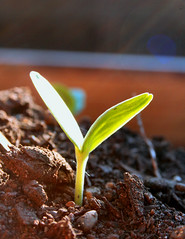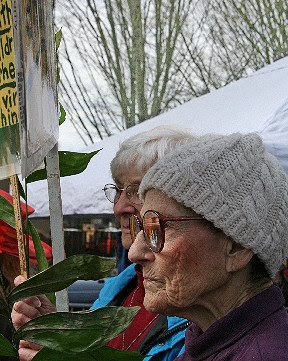Without any undue commentary, I wanted to post the words of another politician from many years ago who had the temerity and the foresight to ask our nation to conserve, to use our resources wisely, to invest in the infrastructure for public transit and alternative energies. Let's hope Mr. Obama doesn't suffer the same fate that Jimmy Carter did, a president of integrity and action whose career as president was way too short.
Here are Mr. Carter's words from 1977. They ring as true (or actually much truer) today than they did back then:
=============================
Tonight I want to have an unpleasant talk with you about a problem unprecedented in our history. With the exception of preventing war, this is the greatest challenge our country will face during our lifetimes. The energy crisis has not yet overwhelmed us, but it will if we do not act quickly.
It is a problem we will not solve in the next few years, and it is likely to get progressively worse through the rest of this century.
We must not be selfish or timid if we hope to have a decent world for our children and grandchildren.
We simply must balance our demand for energy with our rapidly shrinking resources. By acting now, we can control our future instead of letting the future control us.
Two days from now, I will present my energy proposals to the Congress. Its members will be my partners and they have already given me a great deal of valuable advice. Many of these proposals will be unpopular. Some will cause you to put up with inconveniences and to make sacrifices.
The most important thing about these proposals is that the alternative may be a national catastrophe. Further delay can affect our strength and our power as a nation.
Our decision about energy will test the character of the American people and the ability of the President and the Congress to govern. This difficult effort will be the "moral equivalent of war" -- except that we will be uniting our efforts to build and not destroy.
I know that some of you may doubt that we face real energy shortages. The 1973 gasoline lines are gone, and our homes are warm again. But our energy problem is worse tonight than it was in 1973 or a few weeks ago in the dead of winter. It is worse because more waste has occurred, and more time has passed by without our planning for the future. And it will get worse every day until we act.
The oil and natural gas we rely on for 75 percent of our energy are running out. In spite of increased effort, domestic production has been dropping steadily at about six percent a year. Imports have doubled in the last five years. Our nation's independence of economic and political action is becoming increasingly constrained. Unless profound changes are made to lower oil consumption, we now believe that early in the 1980s the world will be demanding more oil that it can produce.
The world now uses about 60 million barrels of oil a day and demand increases each year about 5 percent. This means that just to stay even we need the production of a new Texas every year, an Alaskan North Slope every nine months, or a new Saudi Arabia every three years. Obviously, this cannot continue.
We must look back in history to understand our energy problem. Twice in the last several hundred years there has been a transition in the way people use energy.
The first was about 200 years ago, away from wood -- which had provided about 90 percent of all fuel -- to coal, which was more efficient. This change became the basis of the Industrial Revolution.
The second change took place in this century, with the growing use of oil and natural gas. They were more convenient and cheaper than coal, and the supply seemed to be almost without limit. They made possible the age of automobile and airplane travel. Nearly everyone who is alive today grew up during this age and we have never known anything different.
Because we are now running out of gas and oil, we must prepare quickly for a third change, to strict conservation and to the use of coal and permanent renewable energy sources, like solar power.
The world has not prepared for the future. During the 1950s, people used twice as much oil as during the 1940s. During the 1960s, we used twice as much as during the 1950s. And in each of those decades, more oil was consumed than in all of mankind's previous history.
World consumption of oil is still going up. If it were possible to keep it rising during the 1970s and 1980s by 5 percent a year as it has in the past, we could use up all the proven reserves of oil in the entire world by the end of the next decade.
I know that many of you have suspected that some supplies of oil and gas are being withheld. You may be right, but suspicions about oil companies cannot change the fact that we are running out of petroleum.
All of us have heard about the large oil fields on Alaska's North Slope. In a few years when the North Slope is producing fully, its total output will be just about equal to two years' increase in our nation's energy demand.
Each new inventory of world oil reserves has been more disturbing than the last. World oil production can probably keep going up for another six or eight years. But some time in the 1980s it can't go up much more. Demand will overtake production. We have no choice about that.
But we do have a choice about how we will spend the next few years. Each American uses the energy equivalent of 60 barrels of oil per person each year. Ours is the most wasteful nation on earth. We waste more energy than we import. With about the same standard of living, we use twice as much energy per person as do other countries like Germany, Japan and Sweden.
One choice is to continue doing what we have been doing before. We can drift along for a few more years.
Our consumption of oil would keep going up every year. Our cars would continue to be too large and inefficient. Three-quarters of them would continue to carry only one person -- the driver -- while our public transportation system continues to decline. We can delay insulating our houses, and they will continue to lose about 50 percent of their heat in waste.
We can continue using scarce oil and natural to generate electricity, and continue wasting two-thirds of their fuel value in the process.
If we do not act, then by 1985 we will be using 33 percent more energy than we do today.
We can't substantially increase our domestic production, so we would need to import twice as much oil as we do now. Supplies will be uncertain. The cost will keep going up. Six years ago, we paid $3.7 billion for imported oil. Last year we spent $37 billion -- nearly ten times as much -- and this year we may spend over $45 billion.
Unless we act, we will spend more than $550 billion for imported oil by 1985 -- more than $2,500 a year for every man, woman, and child in America. Along with that money we will continue losing American jobs and becoming increasingly vulnerable to supply interruptions.
Now we have a choice. But if we wait, we will live in fear of embargoes. We could endanger our freedom as a sovereign nation to act in foreign affairs. Within ten years we would not be able to import enough oil -- from any country, at any acceptable price.
If we wait, and do not act, then our factories will not be able to keep our people on the job with reduced supplies of fuel. Too few of our utilities will have switched to coal, our most abundant energy source.
We will not be ready to keep our transportation system running with smaller, more efficient cars and a better network of buses, trains and public transportation.
We will feel mounting pressure to plunder the environment. We will have a crash program to build more nuclear plants, strip-mine and burn more coal, and drill more offshore wells than we will need if we begin to conserve now. Inflation will soar, production will go down, people will lose their jobs. Intense competition will build up among nations and among the different regions within our own country.
If we fail to act soon, we will face an economic, social and political crisis that will threaten our free institutions.
But we still have another choice. We can begin to prepare right now. We can decide to act while there is time.
That is the concept of the energy policy we will present on Wednesday. Our national energy plan is based on ten fundamental principles.
The first principle is that we can have an effective and comprehensive energy policy only if the government takes responsibility for it and if the people understand the seriousness of the challenge and are willing to make sacrifices.
The second principle is that healthy economic growth must continue. Only by saving energy can we maintain our standard of living and keep our people at work. An effective conservation program will create hundreds of thousands of new jobs.
The third principle is that we must protect the environment. Our energy problems have the same cause as our environmental problems -- wasteful use of resources. Conservation helps us solve both at once.
The fourth principle is that we must reduce our vulnerability to potentially devastating embargoes. We can protect ourselves from uncertain supplies by reducing our demand for oil, making the most of our abundant resources such as coal, and developing a strategic petroleum reserve.
The fifth principle is that we must be fair. Our solutions must ask equal sacrifices from every region, every class of people, every interest group. Industry will have to do its part to conserve, just as the consumers will. The energy producers deserve fair treatment, but we will not let the oil companies profiteer.
The sixth principle, and the cornerstone of our policy, is to reduce the demand through conservation. Our emphasis on conservation is a clear difference between this plan and others which merely encouraged crash production efforts. Conservation is the quickest, cheapest, most practical source of energy. Conservation is the only way we can buy a barrel of oil for a few dollars. It costs about $13 to waste it.
The seventh principle is that prices should generally reflect the true replacement costs of energy. We are only cheating ourselves if we make energy artificially cheap and use more than we can really afford.
The eighth principle is that government policies must be predictable and certain. Both consumers and producers need policies they can count on so they can plan ahead. This is one reason I am working with the Congress to create a new Department of Energy, to replace more than 50 different agencies that now have some control over energy.
The ninth principle is that we must conserve the fuels that are scarcest and make the most of those that are more plentiful. We can't continue to use oil and gas for 75 percent of our consumption when they make up seven percent of our domestic reserves. We need to shift to plentiful coal while taking care to protect the environment, and to apply stricter safety standards to nuclear energy.
The tenth principle is that we must start now to develop the new, unconventional sources of energy we will rely on in the next century.
These ten principles have guided the development of the policy I would describe to you and the Congress on Wednesday.
Our energy plan will also include a number of specific goals, to measure our progress toward a stable energy system.
These are the goals we set for 1985:
--Reduce the annual growth rate in our energy demand to less than two percent.
--Reduce gasoline consumption by ten percent below its current level.
--Cut in half the portion of United States oil which is imported, from a potential level of 16 million barrels to six million barrels a day.
--Establish a strategic petroleum reserve of one billion barrels, more than six months' supply.
--Increase our coal production by about two thirds to more than 1 billion tons a year.
--Insulate 90 percent of American homes and all new buildings.
--Use solar energy in more than two and one-half million houses.
We will monitor our progress toward these goals year by year. Our plan will call for stricter conservation measures if we fall behind.
I cant tell you that these measures will be easy, nor will they be popular. But I think most of you realize that a policy which does not ask for changes or sacrifices would not be an effective policy.
This plan is essential to protect our jobs, our environment, our standard of living, and our future.
Whether this plan truly makes a difference will be decided not here in Washington, but in every town and every factory, in every home an don every highway and every farm.
I believe this can be a positive challenge. There is something especially American in the kinds of changes we have to make. We have been proud, through our history of being efficient people.
We have been proud of our leadership in the world. Now we have a chance again to give the world a positive example.
And we have been proud of our vision of the future. We have always wanted to give our children and grandchildren a world richer in possibilities than we've had. They are the ones we must provide for now. They are the ones who will suffer most if we don't act.
I've given you some of the principles of the plan.
I am sure each of you will find something you don't like about the specifics of our proposal. It will demand that we make sacrifices and changes in our lives. To some degree, the sacrifices will be painful -- but so is any meaningful sacrifice. It will lead to some higher costs, and to some greater inconveniences for everyone.
But the sacrifices will be gradual, realistic and necessary. Above all, they will be fair. No one will gain an unfair advantage through this plan. No one will be asked to bear an unfair burden. We will monitor the accuracy of data from the oil and natural gas companies, so that we will know their true production, supplies, reserves, and profits.
The citizens who insist on driving large, unnecessarily powerful cars must expect to pay more for that luxury.
We can be sure that all the special interest groups in the country will attack the part of this plan that affects them directly. They will say that sacrifice is fine, as long as other people do it, but that their sacrifice is unreasonable, or unfair, or harmful to the country. If they succeed, then the burden on the ordinary citizen, who is not organized into an interest group, would be crushing.
There should be only one test for this program: whether it will help our country.
Other generation of Americans have faced and mastered great challenges. I have faith that meeting this challenge will make our own lives even richer. If you will join me so that we can work together with patriotism and courage, we will again prove that our great nation can lead the world into an age of peace, independence and freedom.
 It's no wonder that ancient peoples celebrated this season with ritual, song, and dance. There's something very magical about everything sprouting up from the earth, fresh and green (unless it's one of the ten million weeds in my garden, the magic wears off slightly when I contemplate them.)
It's no wonder that ancient peoples celebrated this season with ritual, song, and dance. There's something very magical about everything sprouting up from the earth, fresh and green (unless it's one of the ten million weeds in my garden, the magic wears off slightly when I contemplate them.) In one fell swoop, I finished weeding our new fenced garden and planted it all. Corn, cucumbers, beets, spinach, pole beans, peppers, tomatoes, basil, cilantro, melons and pumpkins - now that's an exciting menu! It's nice to have the space to do the bigger things like pumpkins that are harder in the raised beds. Can't wait to see the little sprouts... On the downside, hubby accidentally threw away my baggies of "old plant pods" (i.e. the seeds I saved from last year's beans, peas, and edameme) so I can't see how my first seed-saving project went. I'll have to try again this year and do a better job of labeling my baggy.
In one fell swoop, I finished weeding our new fenced garden and planted it all. Corn, cucumbers, beets, spinach, pole beans, peppers, tomatoes, basil, cilantro, melons and pumpkins - now that's an exciting menu! It's nice to have the space to do the bigger things like pumpkins that are harder in the raised beds. Can't wait to see the little sprouts... On the downside, hubby accidentally threw away my baggies of "old plant pods" (i.e. the seeds I saved from last year's beans, peas, and edameme) so I can't see how my first seed-saving project went. I'll have to try again this year and do a better job of labeling my baggy.

















































